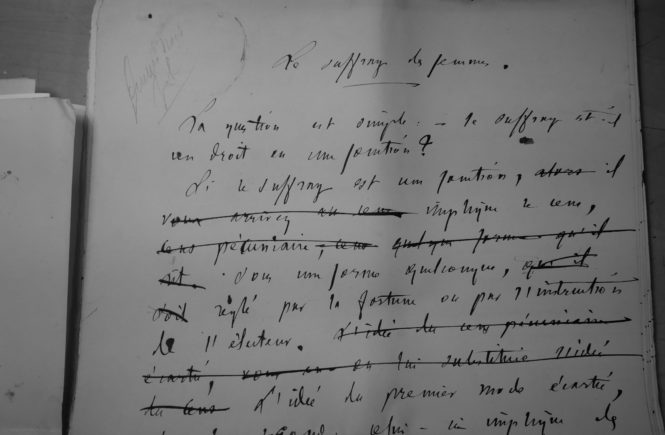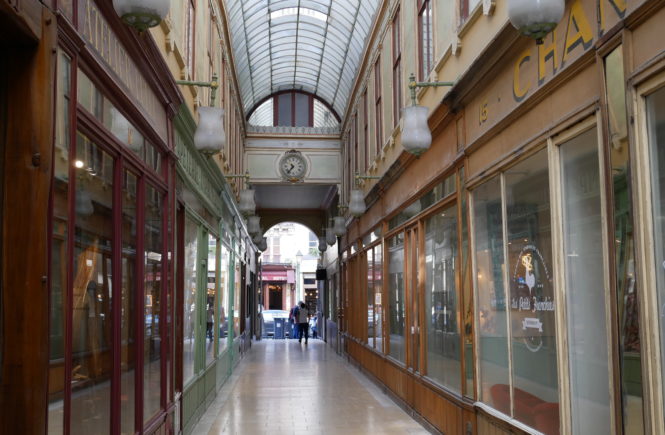Liberal or Proto-Socialist?
Gustave De Molinari’s attempt to join the Liberal Party in Belgium (1859)
by Dries Van Thielen
Dries Van Thielen (°1992) is a Belgian historian with an interest in nineteenth-century economics and migration patterns. He’s currently researching the economic history in 19th century Belgium and Paris through the eyes of Gustave De Molinari. He started this research project when an editor of this journal asked the question in 2013 ‘Ou sont les belges?’. This article is loosely based on the introduction of his Dutch translation of ‘De la production de la sécurité’ (along with Joeri Vandendriessche, expected to appear in 2018/2019 by Liberaal Archief).
Some French economists centered around the Journal des Economistes were elected officials. For example, Louis Wolowski was elected to the Assemblée Constitutionelle in 1848;[1] so was juge de Paix Frédéric Bastiat. Decades earlier, Jean-Baptiste Say and Benjamin Constant were famously defending Classical Economics in the Tribunat where they opposed Napoleon Bonaparte. Bonaparte returned the favor and expelled both of them in 1804 and 1802 respectively.[2]
Unlike the aforementioned economists, Gustave De Molinari never was a politician himself. However, this does not mean that he never ran for office. In this short overview, I’ll present De Molinari’s failed attempt to join the ranks of the liberal party in 1859.
Left or right?
In his 1864 book review of De Molinari’s Cours d’économie politique, Lord Acton points out the turbid relationship between the Liegeois-born economist and the Liberal Party: “[In] 1848, he returned to his own country, and finished his course of political economy at the Musée d’Industrie of Brussels, where, we believe, he has not been altogether well treated by the Liberal ministry. This gives a personal significance to his protest against the nomenclature of the two parties, which falsely implies that the one comprises all that is religious, and the other all that loves liberty, in Belgium”.[3]
Indeed, De Molinari wasn’t the keenest on political demarcations; in earlier writings, he had presented the fluidity between the nomenclature of liberal, religious, and even socialist party structures. Historian Roderick T. Long pointed out that De Molinari favored a collaboration with the French socialist party.[4] According to him, both economists and socialists favored the same principles. In his Lettre aux socialistes (1848), the anonymous author (later identified as De Molinari) stressed that both economists and socialists favored a society in which justice was prevalent for every individual member. However, both groups used a different methodology. Economists thought of liberty and freedom as the necessary means to reach said goal, as history has shown them time and time again. Socialists, on the other hand, used statist recipes with taxes.
En réaction
On June 3, 1859, De Molinari presented himself at the Liberal Party Convention in Brussels. Within five minutes of his speech, the Party made clear that De Molinari wasn’t the right person to represent the Liberal Party. They criticized him on two different grounds, presented to him by journalist Charles Potvin.
Firstly, they accused him of “misuse of vocabulary”. In his speech, De Molinari argued that he was ‘en reaction‘ against socialism during the Revolution of 1848.[5] For example, he opposed Louis Blanc and his fellow comrades in the short-lived newspaper Jacques Bonhommes along with Frédéric Bastiat, Joseph Garnier, and Charles Coquelin.[6] Unfortunately, the crowd, made up by anti-revolutionary (even socialist) voices, did not appreciate his choice of words.
When he uttered the words ‘en réaction’, they were met with sneers, disbelief and shouting. Charles Potvin climbed on stage and for the next hour and a half, he addressed the crowd: “Nous sommes ici pour discuter les candidates: […] la simple politesse que je dois à M[onsieur de] Molinari – que je n’ai pas l’honneur de connaître me permet de lui dire que vis-à-vis d’un corps électoral comme celui à Bruxelles, un mot parcil rend sa candidature impossible”.[7]
Blanc VS Coquelin
“Le Malheur de M[onsieur de] Molinari est d’avoir trouvé à Bruxelles les adversaires qu’il avait combattu à Paris”, concluded another newspaper.[8] While living in Paris, De Molinari must have read his friend Charles Coquelin’s research on banks. Coquelin defended a free-market approach on banking; he preached the concept that the government should have no involvement in the role of banking. Rather, banks should be left alone. After empirical research on business cycles, Coquelin concluded that banking crises were the result of privileged monopolies and governmental regulation.[9]
Potvin opposed this vision: “M[onsieur] De Molinari proclame ce principe: les personnes civiles ont le droit de se constituer sans l’intervention de l’Etat. […] La personne civile vient au monde, et l’Etat enregistre […], n’est ce pas M[onsieur de] Molinari? (De Molinari fait un signe d’approbation). La Belgique ne serait-il pas exposée à une double invasion de moines et des banquiers?”[10]
Potvin’s opinion on banking changed over time – whilst always remaining in the realm of radical socialism. In his biography, Christophe De Spiegeleer argues that Potvin shows appreciation for the works of PJ Proudhon in his essays (Du Gouvernement de soi-même, La Banque Sociale). Proudhon proposes ‘la Banque du Peuple’; a company in which the people (ipse facto: the poorest individuals within a society) could borrow a lump sum of money without paying an extra fee. The poorest individuals were shareholders as well.[11] Potvin praised these ‘mutualistic companies’ in his magnum opus Du Gouvernement de Soi-Même (1877).
However, in his exchange with De Molinari, Charles Potvin outs himself as a disciple of Louis Blanc. According to Blanc, the involvement of a government in the realm of banking was of the utmost importance. According to Potvin, spontaneous order and liberty would lead to anarchy in Belgium! For this particular reason, Louis Blanc claimed it necessary to seek government intervention and lift up the competition, in favor of a single, nationalized bank.[12]
Pourquoi j’ai retiré ma candidature
In a pamphlet (Pourquoi j’ai retiré ma candidature), written a couple of days after the fulmination of Potvin, De Molinari announced the renunciation of his candidacy. In 1855, however, he had already predicted his fate within the party. In an article ‘Dialogue entre un électeur et un candidat’, he criticized uninformed vocal minorities that forsake their own responsibilities. In the fictional dialogue, the voter expects politicians to take care of everything; protectionism, warfare, parish relief funds, subsidizing religion,… To which the politician responds whether the voter would favor higher taxes. How would we fund these services? To which the voter responds: “Cela vous regarde. Nous ne vous nommons pas pour autre chose”.[13]
Dries Van Thielen
Bibliography
Newspaper articles
“Aplatissement du vieux libéralisme”, Le Bien Public, 06-06-1859.
“Après l’autel le coffre-fort”, Le Bien Public, 6 juni 1859.
“M. de Molinari et les jeunes libéraux”, l’Echo du Parlement, 13 juni 1859.
Literature
ACTON, John Emerich Edward Dalberg, “Review of Gustave de Molinari’s Course of Political Economy (1855)”, The Home and Foreign Review, 4, 1864, 313.
CHARRUAUD, Benoît, Louis Blanc, la république au service du Socialisme, Onuitgegeven doctoraatsverhandeling, Université Strasbourg III. Robert Schuman, 2008.
DE MOLINARI, Gustave, “Dialogue entre un électeur et un candidat”, l’Economiste belge, 1855, 1.
DE MOLINARI, Gustave, Pourquoi j’ai retiré ma candidature, Brussel, Verbruggen, 1859.
DE MOLINARI, Gustave (vertaling Roderick T. Long), “The Utopia of Liberty: A Letter to Socialists”, Mises Daily, 2016 [1848].
DE NOUVION, Georges, Charles Coquelin. Sa vie et ses travaux, Parijs, Institut Coppet, 2017 [1908].
DE SPIEGELEER, Een blauwe progressist. Charles Potvin (1818-1902) en het liberaal-sociale denken van zijn generatie, Gent/Brussel, Liberaal Archief, 2011.
MALBRANQUE, Benoît, “Réformer les banques: les propositions originales de C. Coquelin”, Laissons Faire, 1, 2013, 20-24;
MINART, Gérard, Entrepreneur et esprit d’entreprise. L’avant-gardisme de Jean-Baptiste SAY, Parijs, l’Harmattan, 2013.
MINART, Gérard, Gustave De Molinari (1819-1912). Pour un gouvernement en bon marché dans un milieu libre, Parijs, Institut Coquelin, 2012.
PROUDHON, Pierre-Joseph, “Banque du peuple: déclaration”, Le Peuple, 1849, 1-13.
RAMBAUD, Jules, l’oeuvre économique de L. Wolowski, Parijs, L. Larose & Forcel, 1882.
______________________
[1] RAMBAUD, Jules, l’oeuvre économique de L. Wolowski, Parijs, L. Larose & Forcel, 1882, 9-29.
[2] MINART, Gérard, Entrepreneur et esprit d’entreprise. L’avant-gardisme de Jean-Baptiste SAY, Parijs, l’Harmattan, 2013, 158-159.
[3] ACTON, John Emerich Edward Dalberg, “Review of Gustave de Molinari’s Course of Political Economy (1855)”, The Home and Foreign Review, 4, 1864, 313.
[4] LONG, Roderick T., “Rothbard’s “Left and Right”: Forty Years Later”, Mises Institute, 2006.
[5] “Aplatissement du vieux libéralisme”, Le Bien Public, 06-06-1859; DE MOLINARI, Pourquoi j’ai retiré ma candidature, Brussel, Verbruggen, 1859.
[6] MINART, Gérard, Gustave De Molinari (1819-1912). Pour un gouvernement en bon marché dans un milieu libre, Parijs, Institut Coquelin, 2012, Chapitre 8: dans la tempête de février 1848.
[7] “Après l’autel le coffre-fort”, Le Bien Public, 6 juni 1859.
[8] “M. de Molinari et les jeunes libéraux”, l’Echo du Parlement, 13 juni 1859.
[9] MALBRANQUE, Benoît, “Réformer les banques: les propositions originales de C. Coquelin”, Laissons Faire, 1, 2013, 20-24; DE NOUVION, Georges, Charles Coquelin. Sa vie et ses travaux, Parijs, Institut Coppet, 2017 [1908], 24-25.
[10] “Après l’autel le coffre-fort”, Le Bien Public, 6 juni 1859.
[11] PROUDHON, Pierre-Joseph, “Banque du peuple: déclaration”, Le Peuple, 1849, 1-13.
[12] CHARRUAUD, Benoît, Louis Blanc, la république au service du Socialisme, Onuitgegeven doctoraatsverhandeling, Université Strasbourg III. Robert Schuman, 2008, 50.
[13] DE MOLINARI, Gustave, “Dialogue entre un électeur et un candidat”, l’Economiste belge, 1855, 1.


